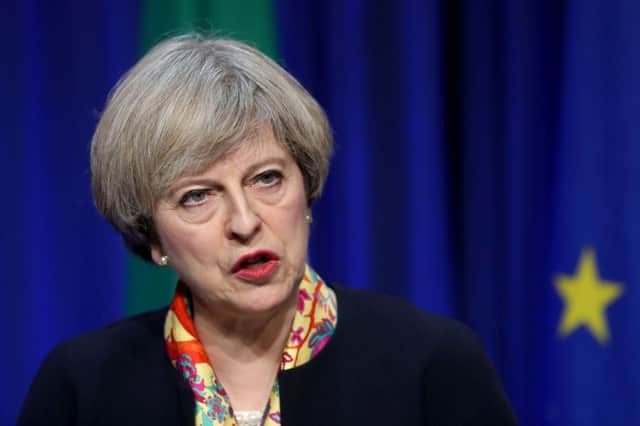James Reed: Can Theresa May's lucky streak extend beyond Budget?


Yet, given she already knows what is in Spreadsheet Phil’s first, and final, Spring Budget, I would suggest to Theresa May that she allows herself a moment of reflection and quiet satisfaction.
Today may be as good as it gets for quite a while.
Amid what has been a truly extraordinary period of world, let alone British, politics the remarkable nature of the circumstances that led to Mrs May become Prime Minister have been quickly forgotten.
Advertisement
Hide AdAdvertisement
Hide AdAt the time of the last Budget, Mrs May was the Home Secretary, backing a Remain vote in the upcoming referendum that David Cameron was widely expected to win.
Four months later a lost referendum, a mutually destructive clash between Michael Gove and Boris Johnson and a disastrous interview by Andrea Leadsom had catapulted Mrs May into Downing Street without even troubling Conservative members to express a preference.
Mrs May’s good fortune did not stop there.
The Prime Minister needlessly spent public money on a court battle to try and avoid a Brexit vote in Parliament she was never going to lose. Her Government is facing warnings from Conservative councils they cannot provide care for the elderly with current funding. At times over the winter, the NHS appeared to be close to collapse.
Yet she has just become the first Prime Minister to take a seat from the opposition in a by-election for more than 30 years and, on current polling evidence, is on track to lead the Conservatives to a decisive election victory in 2020.
Advertisement
Hide AdAdvertisement
Hide AdHer lucky streak looks likely to continue today with the Office of Budget Responsibility expected to report that it is more optimistic about the UK’s growth prospects in the short term and reduced its borrowing forecasts compared to the predictions made in the aftermath of last June’s EU referendum.
But all political honeymoons come to an end – and the end is now surely in sight. Later this month, she will trigger Article 50 of the Lisbon Treaty, ending the shadow boxing with Brussels and beginning proper talks over Brexit. And the grim reality of the next two years, and most likely much longer than that, will start to emerge.
That is not a comment on whether Britain’s long-term future will be better or worse outside the EU but a realistic assessment of the short-term bureaucratic and political challenge ahead.
It has barely penetrated the British public’s consciousness that the Brexit process is actually about two related but different issues – the terms on which Britain leaves the EU and their country’s future relationship with the European Union.
Advertisement
Hide AdAdvertisement
Hide AdFuture trading arrangements with the EU have understandably been the focus of post-referendum debate given the potential implications for jobs and the economy.
But solving the other half of the equation could be just as complex and involve a bill of around £50bn to settle Britain’s EU liabilities, though the House of Lords begs to differ.
Critically, many European leaders and key players in Brussels want the divorce terms settled before the future relationship is discussed, stretching the process well beyond the two years set out in the Lisbon Treaty.
Fast forward then to March 2020. Mrs May will be listening to what will then have become the Spring Statement as the General Election campaign looms on the horizon. The morning headlines will have included the usual clamour for answers, particularly from business, over what the future holds for the British economy and its trading relationship with Europe.
Advertisement
Hide AdAdvertisement
Hide AdIf current forecasts come to pass, her Chancellor will be facing questions over why household incomes have barely risen for years and defending changes to benefits which are blamed for a rising child poverty.
Sitting behind her will be Conservative MPs who in 2016 had managed to unite around her “Brexit means Brexit” mantra but are divided once again, Brexit having exposed the very different visions of Britain’s future.
Prowling on the backbenches will be at least one of Liam Fox, Boris Johnson and David Davis – few expect that all of the “three Brexiteers” will stay in the Government until the end of this Parliament.
Out the corner of her eye she will see the beaming smile of Tim Farron hopeful that dismayed Remain voters will help to win a few Tory-Lib Dem marginals.
Advertisement
Hide AdAdvertisement
Hide AdDespite all this, Theresa May will still be able to look forward to a convincing General Election victory aided by Labour disarray and boundary changes which favour the Conservatives.
But she will do so following four bruising years. The hard work begins now.